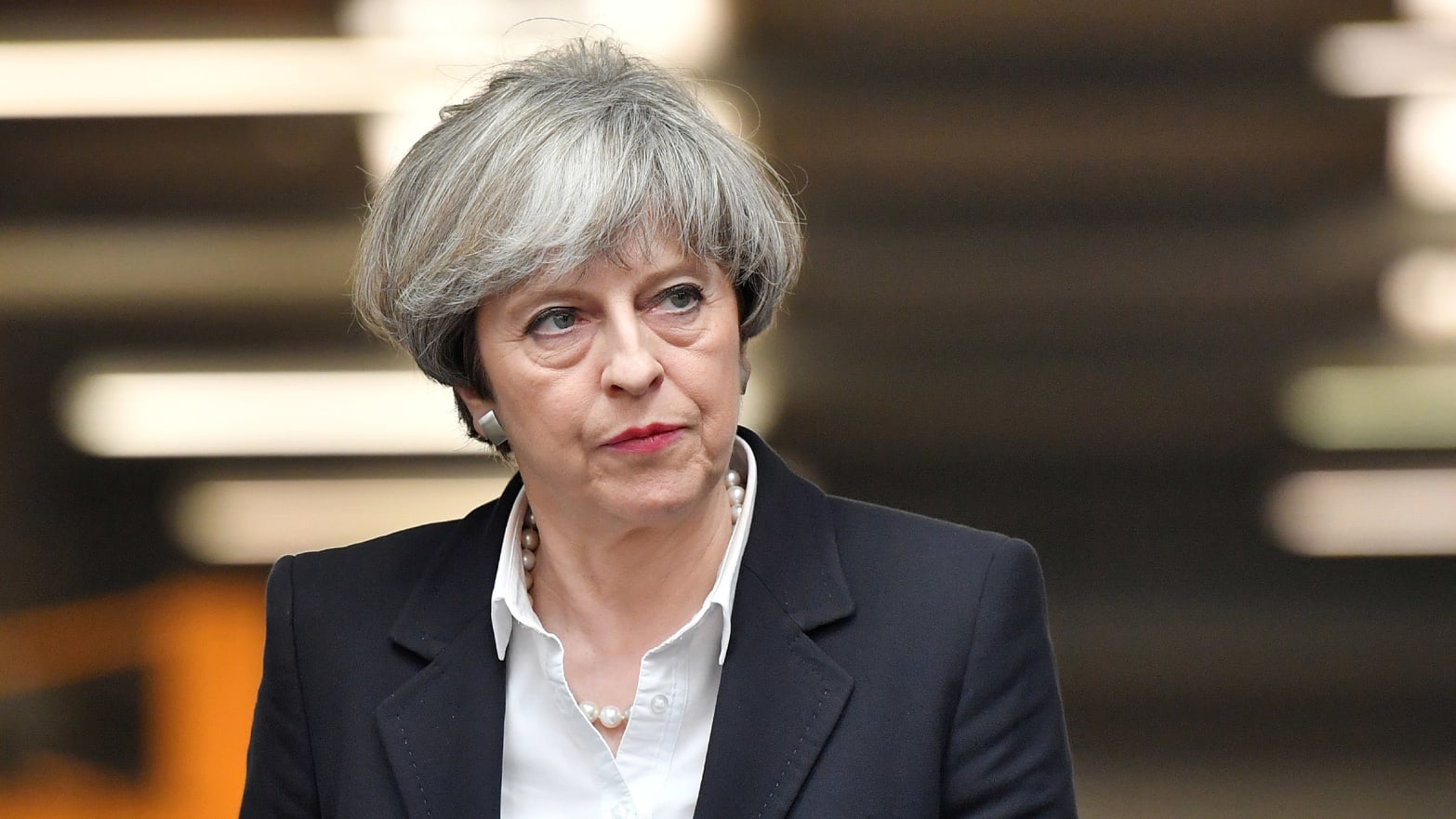LONDON—Britain has been plunged into chaos and uncertainty after the country's general election saw no party win an overall majority of lawmakers in the country’s legislature, resulting in a “hung parliament.”
The result, which seems likely to derail Brexit negotiations, was a personal and political disaster for Theresa May, the Conservative prime minister who called the early election and had been widely expected to sweep the boards, but instead lost seats.
The Conservative party, does, however, remain the largest party.
It is expected that the Conservatives will win 319 seats to Labour’s 261—but May’s authority has been, perhaps fatally, undermined.
In a tumultuous night of election drama, May was humbled by the British electorate and the hard-left Labour leader Jeremy Corbyn, who was previously being written off as the weakest major party leader in a generation.
There were widespread calls for May to resign as the extent of the debacle became clear. She called the snap general election in order to strengthen her Brexit negotiating hand, but instead saw her gamble backfire as the Labour party gained 30 seats, depriving the Conservatives of their narrow overall majority in the House of Commons.
May did not indicate that she would resign however, appearing to suggest, as she made a short speech after winning her own seat, that she would attempt to form a government, saying, “This country needs a period of stability.”
The most likely option is for the Conservatives to ally with the small Northern Irish unionist political party, the Democratic Unionist Party (DUP), which has 10 Members of Parliament (MPs).
Corbyn led calls for May to step down, saying, “Make way for a government that will be truly representative of all of the people of this country.”
With just nine days to go until the official start date of Brexit negotiations, the result was immediately hailed by those opposed to a hard Brexit as a clarion call for a moderate alliance.
Corbyn said during the campaign that he respected the Brexit referendum result, but wanted the U.K. to stay in the single European market, something May had ruled out.
The only member of the Green Party to be returned to Parliament, Caroline Lucas, said that she hoped “progressives” could and would work together to avoid the “extreme” Brexit that Theresa May wanted.
The Liberal Democrats, the only party to explicitly campaign on a platform of remaining in the EU, are expected to take 14 seats, up from the eight they held going into the election.
As dawn broke, it became clear that the Conservatives, while remaining the largest party, could not win the 326 seats needed for an overall majority.
Whether she is able to form a minority government or not, the result is dismal for Britain’s second female prime minister. She called the snap election to increase her slender majority of 12 in the House of Commons but will now end up with far fewer seats.
Throughout the night, tension built as early vote counts suggested that exit-poll predictions, which pointed to a hung parliament, were holding up, with signs of an unexpected Brexit backlash against May in areas that voted to Remain in Europe.
As the results came in, there were some clear regional patterns. Labour swept London on an apparent surge of anti-Brexit sentiment, but the Conservatives performed strongly against the Liberal Democrats outside the capital. In Scotland, the Scottish National Party had a terrible night, losing seats to all three of their main rivals, which should mean the prospect of a second Scottish independence referendum in the near future is receding.
Scottish Conservative leader Ruth Davidson said the SNP losses mean a second independence referendum is now “dead.”
“It isn’t clear who has won this election. but it’s very obvious who has lost, and Mrs. May should face the consequences,” said former SNP leader Alec Salmond, who lost his own seat.
Conservative Member of Parliament Anna Soubry acknowledged that her boss, Theresa May, had a “dreadful” election. “I think she’s in a very difficult place,” she said. “She needs to consider her position.”
The former Tory minister admitted that the result may change the government’s Brexit negotiating position.
By May’s own rationale, a strong majority was required in order to be able to deliver successful Brexit negotiations. Politicians from all of the main parties said overnight that the Brexit situation had now changed. It is still unlikely that Britain will remain in the EU but there may now be room for negotiating a compromise deal that keeps Britain in the single market or sees the U.K. continue to make substantial contributions in order to be allowed partial access.
Even the most optimistic Jeremy Corbyn fan has spent the last six weeks talking about ways in which the Labour Party could have a good defeat. Hardly anyone believed that Britain could be forced into a hung parliament.
“This is astonishingly bad,” said Simon Hix, professor of political science at the London School of Economics. “The knives have been out for several weeks. It’s a question of how long May can survive this.”
She was seen as a safe pair of hands when she assumed the role in July last year, but she only had a working majority of 12 in the House of Commons, which meant factions on either wing of the Conservative Party were able to hold her hostage on a host of issues, principally involving Britain’s complicated divorce proceedings from the European Union.
May wanted a much bigger majority—and a mandate of her own. David Cameron’s post-Brexit resignation and an abortive Tory leadership election made her the default choice. She wanted to be able to say the country had chosen her.
Her wish has in one sense been granted because she won the most seats—but it has come at catastrophic cost.
Sir Robert Worcester, who founded the MORI polling company in 1969, said he saw strong parallels between May and Hillary Clinton. “It’s a very good comparison—May was very good running a department, being a senior minister but a lousy campaigner,” he told The Daily Beast. “Neither have the charm oozing out of them like Bill Clinton, but May could have done better, everything was so fixed—closed events with no questions, she could have taken a bit of heckling, maybe gone to Speaker’s Corner?”
What looked like a guaranteed landslide election—with much of the electoral map turning blue for the Conservatives—appeared to transform into a much tighter race during the short campaign.
Last month, districts like Ilford North, a suburb to the east of London that has bounced back and forth between Labour and the Conservatives since 1992, were expected to easily revert to the Tories as the Labour vote was wiped out in all but the most urban of areas.
Yet polls this week suggested that swing districts were very much back in play, and, in the event Labour successfully defended its tiny majority in Ilford North.
Britain does not have a presidential system, so votes are cast for prospective members of Parliament (MPs) who will, in turn, select a prime minister.
However, in reality, most voters interviewed by The Daily Beast said the decision for them was a straight shootout between May and Corbyn.
“This is the most appalling election I’ve come across,” said Patricia Miller, 82, a retired company assistant. “At the beginning of this, I thought Theresa May was strong and stable, and Jeremy Corbyn was unelectable, but she has struggled in stressful situations in the campaign. She’s weak and wobbly.”
Sam Jameson, 39, who runs her own cosmetics company called Soapsmith, said she had voted Conservative.
“People would have expected me to vote Labour,” she said. “I do like Corbyn, he’s got some nice policies that people want—like nationalization—but he’s got a raggley-taggley bunch of MPs.”
Labour achieved their stunning result with the most left-wing manifesto in a generation, which promised to bring rail and water back into public ownership, raise tax on companies and wealthy individuals, and increase spending on the National Health Service, education, and social care.
Joan Stansfield, 60, said she had decided to return to the Labour fold in recent weeks because Westminster had become stale. “My generation has been very selfish. Corbyn has brought a new freshness to politics,” she said.
But no-one was expecting this much freshness.


